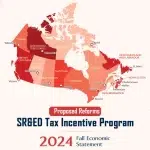The largest source of financial support for research and development (R&D) projects provided by the Government of Canada is the Scientific Research and Experimental Development (SR&ED) tax incentive program. However, only some R&D projects qualify for this program. Canada Revenue Agency (CRA) administers this federal tax incentive program. This blog will provide detailed guidance on the projects that qualify for the SR&ED program. You can hire an SR&ED consulting firm in Alberta for proper advice on the steps to file and claim tax credit and audit defense services.
Which Organizations Are Eligible For SR&ED Tax Credit?
SR&ED program encourages businesses to conduct R&D to improve existing products, processes, methodologies, etc. The following types of organizations are eligible for SR&ED tax credit.
- Canadian-controlled private organizations – These companies may receive a refundable investment tax credit (ITC) at the rate of 35% on qualified SR&ED expenses up to their limit for the tax year. Otherwise, they may receive a non-refundable ITC at the rate of 15% on the amount exceeding their limit.
- Other corporations – They can claim a non-refundable ITC at the rate of 15% on qualified SR&ED expenses.
- Members of a partnership – Based on the partnership level, the ITC amount is determined and distributed to qualifying members accordingly.
- Individuals and trusts–They can claim a refundable ITC of 15% on eligible SR&ED expenses.
Businesses need to determine their SR&ED expenditure limit. It will help CRA determine the refundable and non-refundable tax credits they may provide.
What Are the Types Of R&D Projects That Qualify For SR&ED Tax Credit?
Any R&D project that contributes to scientific and technological advancement is eligible for SR&ED tax credit. The following categories of work are eligible for SR&ED tax credit.
- Basic Research – These works help advance scientific knowledge without a practical application in view. These works often take place in laboratories and may be published in scientific journals.
- Applied Research – These works are intended to advance scientific knowledge with a practical application in view.
- Experimental Development – These works help accomplish technological advancements by developing or improving products, processes, materials, or devices.
What Other Support Work Qualifies For SR&ED Tax Credit?
Other work may also qualify for this tax incentive program, provided they support the basic research, applied research, and experimental development work. These support works might belong to the following categories.
- Data collection
- Mathematical analysis
- Engineering
- Operations research
- Design
- Computer programming
- Psychological research
- Testing
Which Types of Work Are Not Eligible For SR&ED Tax Credit?
The following types of work are not eligible for SR&ED tax credit.
- R&D capital expenditures
- Regular data collection
- Style modifications
- Sales promotion & market research
- Routine testing and quality control for products, processes, materials, or devices
- Commercial production of new or improved products, materials, devices, or process
- Research in humanities or social sciences
- Exploring or drilling for or manufacturing minerals, natural gas, or petroleum
What SR&ED Expenses Can Businesses Claim?
CRA considers some specific expenses to be eligible for the SR&ED tax credit. These include –
- Subcontractor fees
- Salaries and other wages
- Overhead expenses
- Lease expenses for equipment
- Consumables
- Third-party payment
- Some SR&ED expenses taking place outside of Canada
How much tax credit your business can expect?
Your business can expect the following tax credit.
- SR&ED Investment Tax Credit–You can expect a 15% federal tax credit for qualifying R&D expenses for eligible activities carried within Canada. The credit rate is increased to 35% for small Canada-controlled private corporations, and it is fully refundable.
- Provincial SR&ED incentives – Based on your provincial jurisdiction, the tax credits can range from 4.5% to 37.5%.
- Special Tax Credits – It is applied for specified industries, such as media, IT< film, and video games. Besides, enhanced tax credits may be provided to research conducted by universities, research centers, and research consortia.
When can businesses expect to receive SR&ED tax credits?
The SR&ED program has set the following service standards for processing claims.
- Refundable claims – 120 calendar days from filing the claim
- Non-refundable claims – 365 calendar days from filing the claim
- Claimant-requested adjustments to refundable claims – 240 calendar days from filing the claim
- Claimant-requested adjustments to non-refundable claims – 365 calendar days from filing the claim
How can SR&ED help businesses in claiming the SR&ED tax credit?
If you consider your R&D project to be eligible for SR&ED tax credit, you need to submit Form T661 to claim ITC. The deadline for filing and claiming tax credit is within 18 months after the end of the fiscal year in your company.
SR&ED Hub Advisors offers a wide range of SR&ED services in Alberta, such as providing SR&ED consultation, assessing whether your project qualifies for SR&ED tax credit according to CRA’s guidelines, and filing and claiming tax credit. Further, if your claim is audited, we will help provide required audit defense services, etc. Therefore, for all your needed SR&ED assistance, get in touch with our experienced team at SR&ED Hub Advisors.



